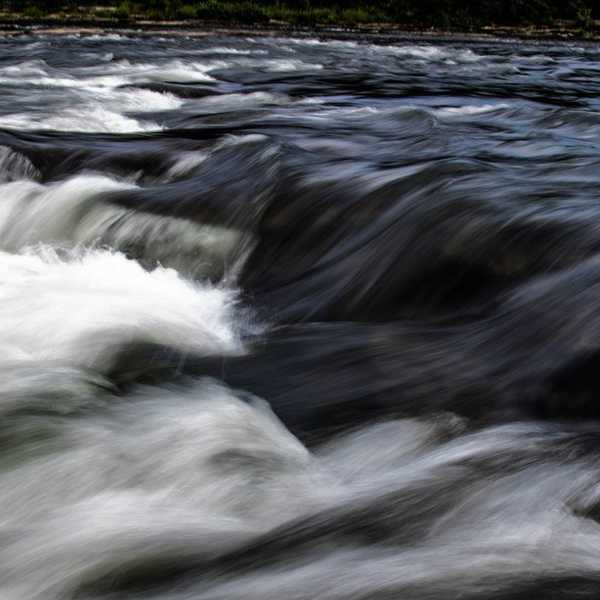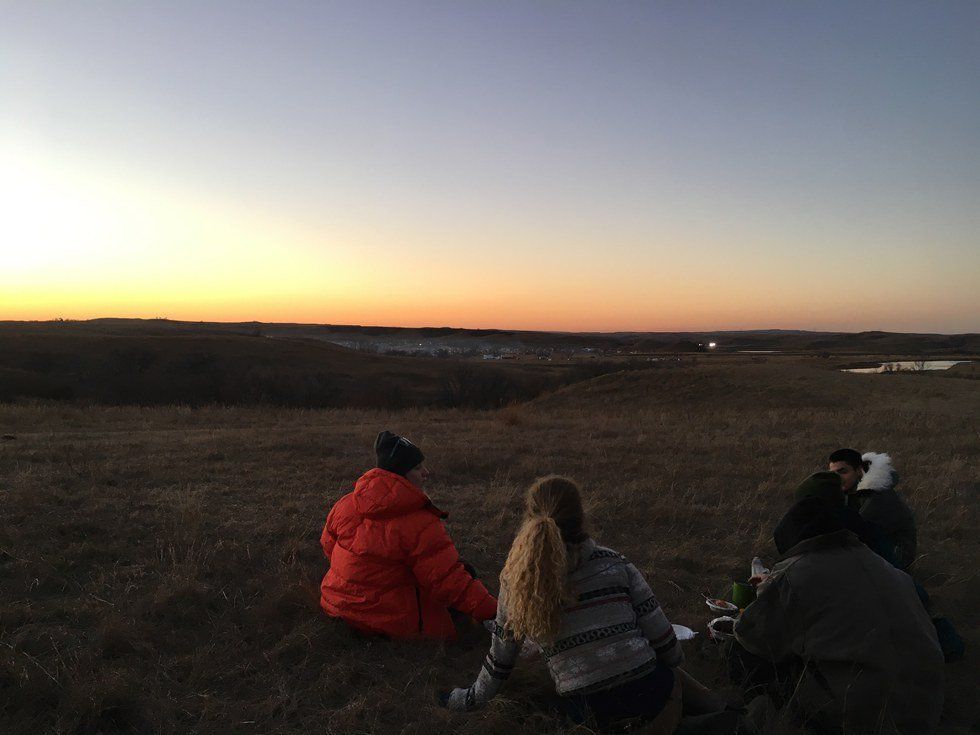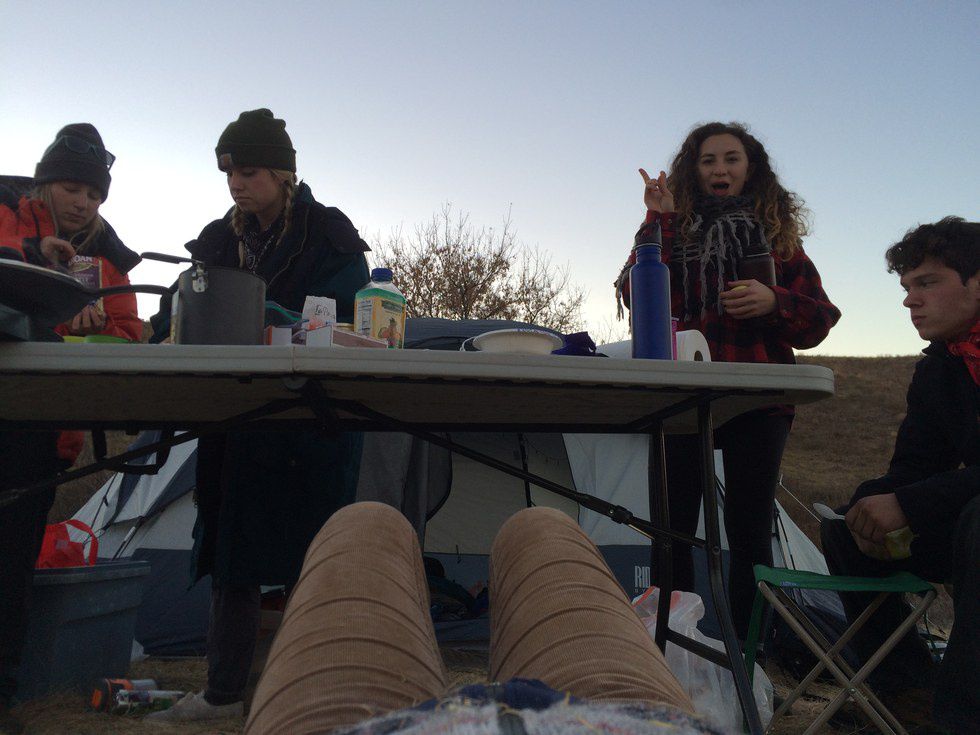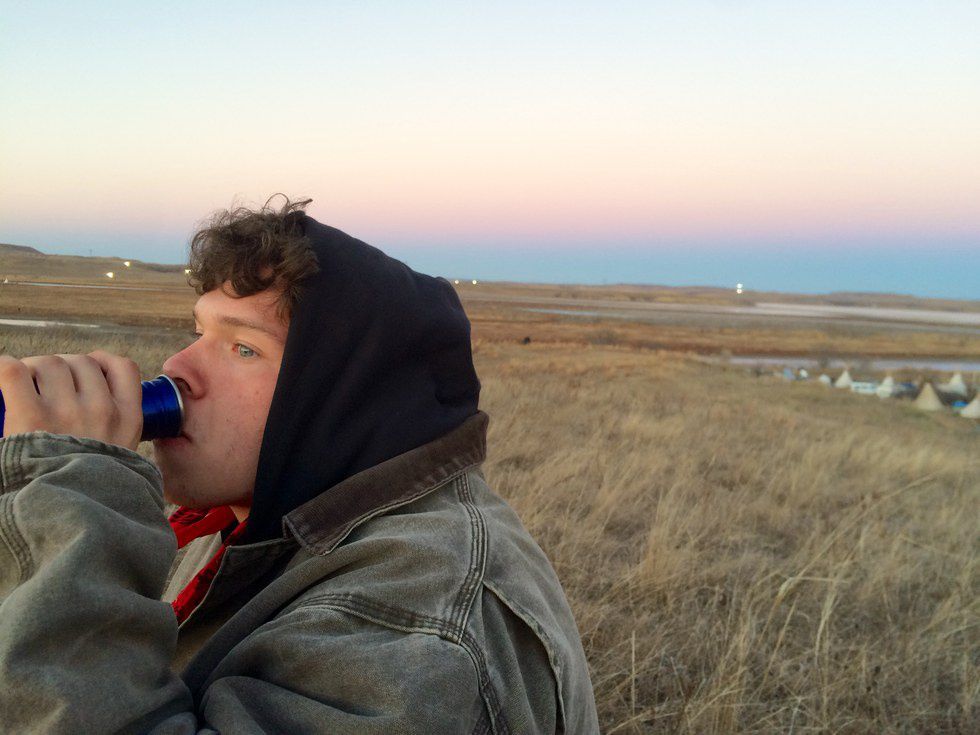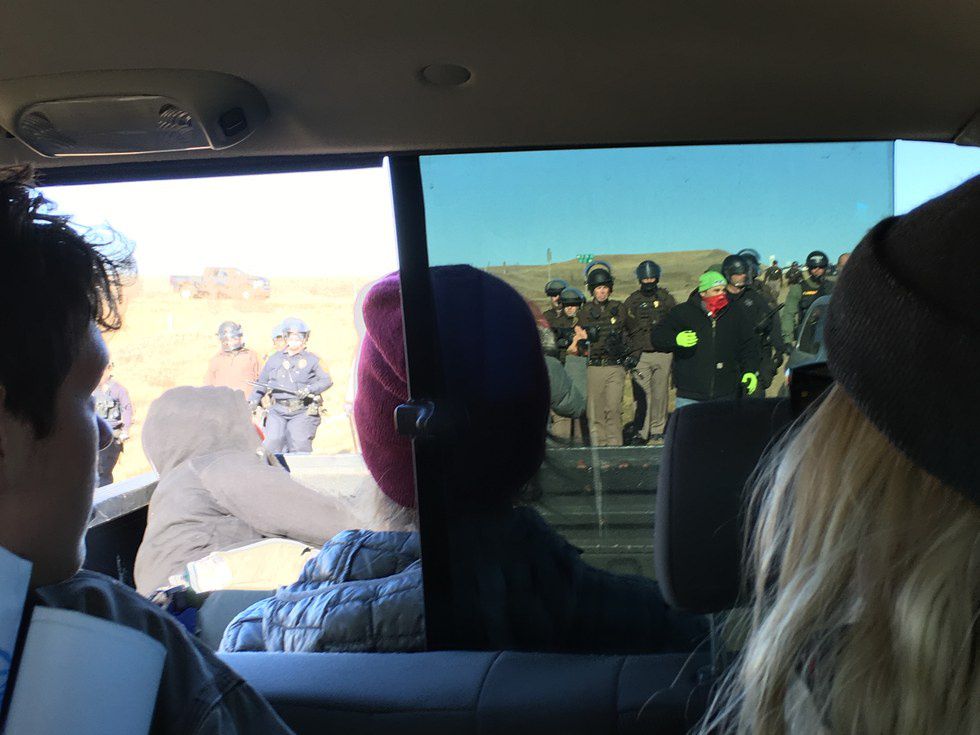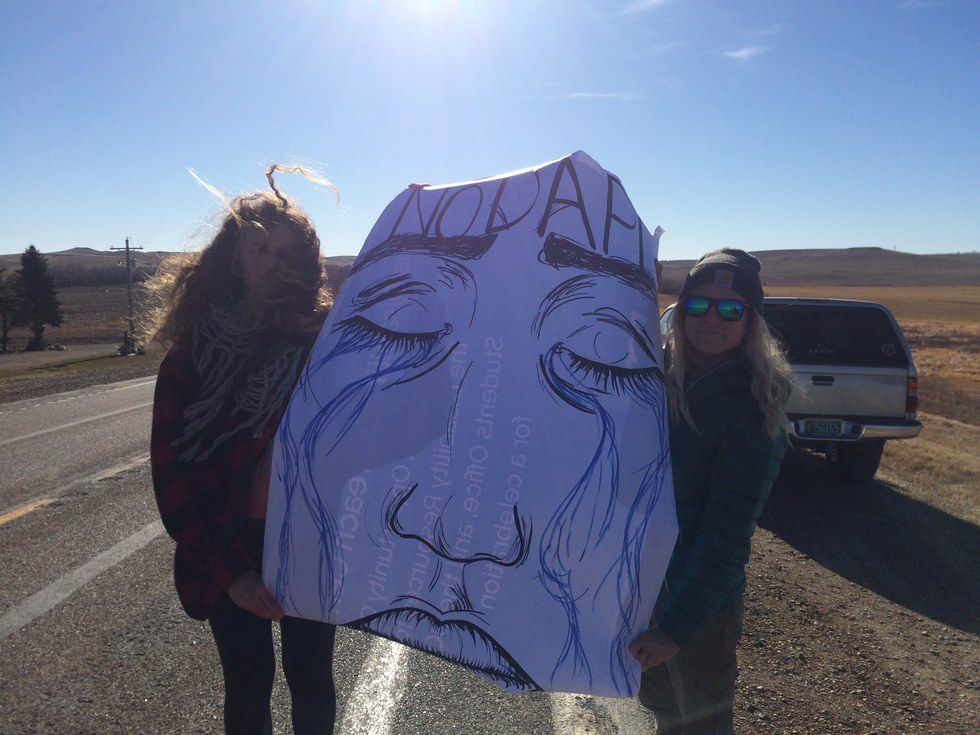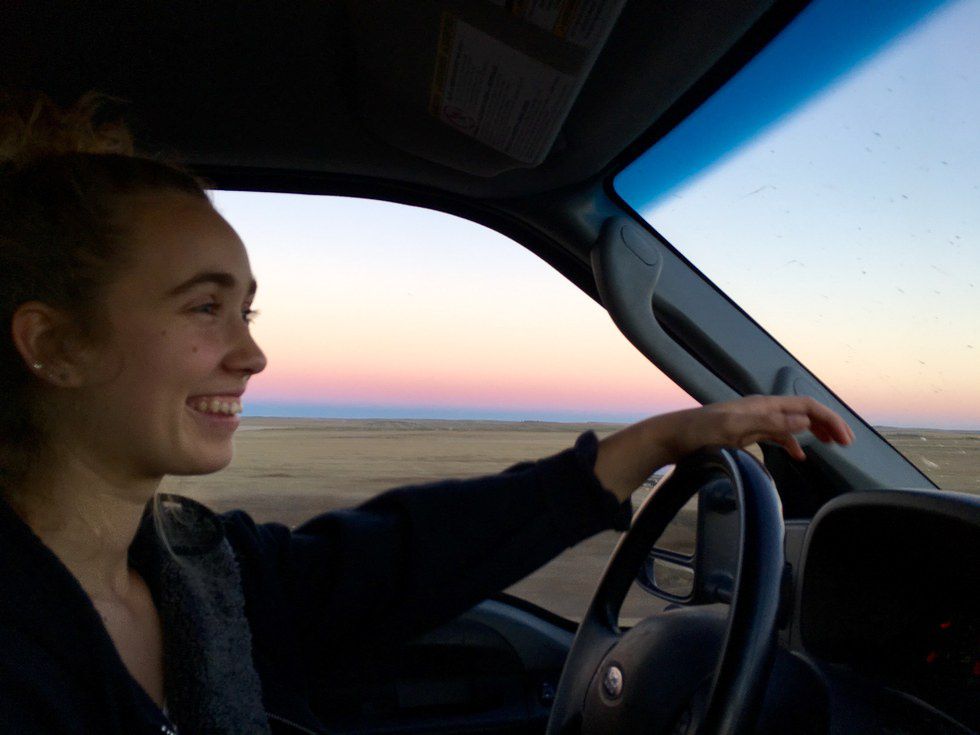On November 8th, I left my humble home to drive 1,350 miles across the country to Cannon Ball, North Dakota—home of the Standing Rock Sioux tribe. As we packed up the car, the outcome of the 2016 presidential debate was just announced, and my heart dropped as I witnessed a friend’s mother crying for our future.
The outcome of the debate left us all feeling numb, while giving us just one more reason to stand up with the people who have had their rights taken away time and time again. After taking a few minutes to grieve, we pile in the car and start to drive.
20-some hours later, we pull into Sacred Stone Camp, where we are greeted by security. A sweet man flashes his light through our car and gives us the rundown on the camp: No drugs, no alcohol, no pictures, no DAPL. As we set up our tent in the dark, the cold starts settling into the valley and we get our first feel of the crispy North Dakota air.
Bundled up in our many layers, we slowly slither into our sleeping bags and snuggle closer to each other, trying to conserve as much heat as possible. One by one, we all drift into sleep, and I start to dream about what tomorrow will bring.
Day 1
I feel my eyes open slowly as the voice of a man chanting fills my ears, and my heart feels the echo of a drum being played. It is 6:30 a.m. and the morning prayer is starting at the main camp, about a 30-minute walk from our tent. I am confused as to whether or not I am awake or still sleeping, and if this is just a continuation of last night's dream.
Sitting up, still snuggled in my two sleeping bags, I look around to see if anyone else is awake and listening to the sound. Soft snores fill the tent, and I try to fall back asleep whilst listening to the man's voice chanting and speaking in a tongue I do not understand.
After falling back asleep for another hour or two, I slide out of my warm sleeping bags and throw on my outer layer to brace myself for the chill of the outside world. As I unzip the tent, I get the first look at the grasslands and the camp in the daylight.
We walk toward the center of camp, smiling and greeting everyone we pass. After some warm oatmeal, we scope out where we should put our donations and meet some people who seem to be in charge.
Together, we walk over to Rosebud, another camp just down the road, and meet a man named George, who helped us figure out where our donations should go and what we should give to each camp.
The rest of the day is spent distributing our donations, which include warm clothes, camping supplies, food, and 2,000 pounds of long-burning energy-efficient wood. We all disperse and meet some people, running into some other students on our walk back to Sacred Stone.
Walking through the camp in North Dakota, the last thing I expected was to pass a familiar face. Turning around a corner, I lock eyes with a friend from my hometown and drop the jackets in my arms, moving forward to wrap my arms around them. After our embrace, we exchanged what little information we had on the camp and continued to sort and organize donations.
After a long day’s work, we walk back to our tent and cook up soup and instant mash potatoes. After finishing our meal, we walk together up the grassy hill behind our tent and look out at the view of main camp and the sun slowly dipping below the horizon. After all the preparation and excitement leading up to this trip, we are finally here, looking out on the land that people are fighting so hard to protect.
Noticing another person on top of the hill, we invite them over and continue to chat and gaze at the sunset until the cold drops in and slowly starts to fill our bones. All of us travel back down the hill, cautious of stepping in paddies of bison droppings, and make our way over to a friend’s fire to warm up.
After hours of laughter around the fire, meeting new people, and trying to warm up our bodies, our group walks back to the tent and tries to find new ways we can sleep that will conserve some heat. Squishing even closer together, we all quiet down and slip down into our sleeping bags to dream the night away.
Day 2
At 5:50 a.m., the alarm goes off, trying to wake us up in order to make it to the morning prayer at main camp, a 30-minute walk away from our warm blankets. I sneak out of the tent to go to the bathroom and can hear the frozen ground crunching under my toes as I walk through the darkness to the honey buckets.
The women all wake up, slowly putting on skirts and boots and layering up in preparation for our frosty morning walk. After procrastinating for 10 minutes or so, we get out of the comfort of our tent and start to walk over to main camp. A heavy fog fills the land -- a fog so thick that we are unable to see the floodlights the police point toward the camp at night.
Shadows of trees appear as we walk, the ground visible for five or so feet in front of us. We reach the fire to join a circle of people, heads bowed listening to the words of whoever is speaking, a bucket of burning sage being passed around in a clockwise direction. Circled around the fire where the prayer is taking place, the air starts to transition from navy to periwinkle as the sounds of the elder men fill our ears.
Our hair begins to freeze, and frost gathers on the outside of our clothes as we wait for our turn to give an offering of tobacco to the fire and touch hands with the elders. After the prayer, we wander through camp and pass an older gentleman with a walker. He looks up at us four women and softly speaks, “Good morning, beloveds." My heart sinks from the kindness of the stranger, and I am unable to wipe the smile off my face for the rest of the day.
Throughout the camp, the treatment of women was so different than American culture, and the time I spent at Standing Rock was the most accepted I have felt as a woman in a society. Women were consistently being praised and recognized for their words of wisdom and strong spiritual connection to the Earth.
Returning to camp, we gathered around the sacred fire and munched on some cereal and warm oatmeal while a man spoke about the event (or direct action) that would be happening later that day: Taking ribs to the Morton County Police Department.
The night before, when I was working in the kitchen with Eric Douglas, more commonly known as Superman, who was in charge of cooking the ribs, he shared with me his excitement to see the cops' faces as they enjoyed his food. We chopped onions and garlic, cooked the ribs, made homemade sauce, and put so much love into preparing the food the night before. I was excited to be able to participate in a peaceful offering of food, and we jumped into the truck and drove into town.
We pick up a woman, D’Ann, who needed a ride to the police station from Sacred Stone, and she directs us toward town. Driving along, we saw something in the distance and made it out to be a huge gathering of cars—half belonging to us, the other half belonging to the police department.
A line of police blocked the road, and they started yelling at the people trying to drive past them in their cars. The scene escalated, and the police started to march toward everyone who had gotten out of their cars and continued to yell, telling us to leave.
I stayed outside the car, video taping the police yelling at us for no good reason and using more force than necessary. As they approached our truck, they were yelling at water protectors and telling them to get in the bed of the truck while continuing to scream at us.
Our hearts racing from the encounter, we drive away from the scene and go back to camp, three people riding in the bed of the truck. Our group splits up -- half of us go to work on setting up the yurts, and I go to help chop and stack wood by the fires.
We work hard throughout the day, and work until the sun sets below the hill where our camp is set up. The moon was only two days away from being full, and it rose above the sacred fire, visible through a hole in the tarp that kept everyone dry from dew. Watching the moon, I slowly drift into sleep in my chair and dream of the stars above.
Day 3
This day was our last full day, and I woke up excited to help and participate in camp as much as possible before having to say goodbye the next day. After breakfast, I started to help carry teepee poles and ran into more friends from home. Together, we lifted over 100 poles and stacked them in the field. A few days from now, these poles would create a home for people over the winter, and it felt good to sweat in the crisp sun.
After moving the poles, we helped with moving more wood and unpacked a car full of donations. After just a few days, I felt as though I knew where everything went and felt very confident helping newcomers and telling them where they should distribute their donations.
Whilst taking a break around the coffee fire, I got to talk with a wonderful family who spends their weekends at Sacred Stone. The 10-year-old daughter named Jillian, who refers to herself as Funshine, and I bonded quickly over our love of braids and stars, and we worked together throughout the day—from washing dishes to folding towels and even directing donations to different parts of the camp, we stood next to each other and shared stories.
After a few hours of working, we decided to take a break and raced up to the top of the hill. Funshine and I danced in the tall grass and sang songs together as we explored the land around camp. On the outskirts of the camp, there was a red statue of a man sitting with his arms crossed, elbows resting on the top of his kneecaps.
As we ran over to the statue, Funshine reached back and grabbed my hand, pulling me along with her as we laughed and skipped. Sharing that moment with her, feeling very present in what was happening around me, I couldn’t help but smile.
After climbing on and around the statue for half an hour or so, we went down to the river and squished the cool mud through our toes. Kicking mud and water at each other, we laughed until our sides hurt and slowly made our way back to camp.
The sun slowly sank down, marking our last night at camp. We gathered around the fire, speaking softly of what we accomplished that day. I stared at the moon any opportunity I could, and could feel the stars begin to shine. I left the sacred fire and walked back to the statue by myself, where I ran into a man from Iceland.
We casually spoke for a while, walking up to the statue together where we drank tea and shared tobacco, our eyes focused on the moon above. After a while, my friends found us at the top and we all huddled together under the statue, sharing our warmth.
Later on in the night, we wandered back to the sacred fire in search of heat and entered a conversation about the treatment of women. A man in the circle asked how he could help a woman's voice be heard without drowning her out in the process. All of the women, myself included, tried to find a response to this question that I had never been asked before.
As we responded, I felt the connection between all the women in the circle and felt very welcomed and at home around the fire. It was so amazing having my voice wanted, listened to, and respected from everyone around me. The group of us continued to talk throughout the night, passing around a “talking stick” and bringing all of our attention to whoever was speaking.
After hours and hours of words being exchanged, we decided to go to sleep around 4:30 a.m. Sinking into my sleeping bag for the last time, my heart was filled to the brim with happiness, and I could feel the love that everyone in the circle passed onto me settle into my soul.
Day 4
Jumping out of my sleeping bag, I ran outside to lie in the grass and look up at the sunshine peeking over the hill. The energy from the previous night's conversation still rushing through my veins, I greeted the day with as much positivity as I could.
We all woke up one by one, me being the third awake. I got out of the tent, made my way to some food, and enjoyed coffee and breakfast around the fire. Once everyone was awake, we started to pack up our tent and get ready to leave. Our plan was to leave after dinner, so we continued to help out throughout the day.
Bouncing back and forth between doing dishes and moving wood, I got to spend more time with the friends I had met, and had Funshine by my side almost the whole day.
That afternoon was the opening of the Mongolian yurt village, which is now the largest yurt village outside of Asia. Our group went over there and listened to the many speeches made by people involved. Everyone who helped make the yurts was asked to stand, and everyone in the camp went one by one and thanked every individual who helped in the construction of the yurt village.
After almost half an hour of thanking people, shaking hands, and sharing hugs, we dispersed and got back to work. Later that evening, a small group of us walked over to the main camp to participate in a candle light vigil that was put on by the youth council.
We gathered around the seven council fire and listened to the songs and prayers given by indigenous youth. All of us were given a candle, and hundreds of us starting walking towards the river, where many water protectors had been sprayed by mace and shot with rubber bullets just weeks before.
As we walked, we held each other’s hands and became one force making our way toward the glimmering water. Once we reached the river, the youth council sang another song and everyone around joined in. Looking behind me, I could not make out where people ended and open land started. Many people from all different backgrounds gathered together to carry candles across the land and bless the water together.
Walking back from the candle light vigil, I knew I had to say my goodbyes to all of the beautiful people I had become close with over the past four days. I walked around camp, giving out hugs and words to remember me to everyone that I had interacted with.
The last goodbye is always the hardest, and a group of us all wrapped our arms together, bowed our heads and said our parting words. Our friends at camp prayed for our safe travel home, and I prayed that all of us would be together again someday. After we had said our goodbyes, we walked back to the car with tears in our eyes and love in our hearts.
Six of us squished into the car, and I softly spoke my parting words to the land as we drove past security and onto the open road. My body has returned to Washington state safely, but a huge part of my heart and soul is still sitting around the sacred fire, listening to the giggles of the children and smelling the cedar burning in the blue flames.
Soon, I will be traveling back to North Dakota with a new group of people to bring more donations, support, love, and prayers to the brave individuals protecting the water. That land is sacred and needs all the love it can get. Thank you to everyone who was part of my experience at Sacred Stone, my amazing support system here in Washington, and everyone who contributed to the journey. With love and support, this battle can be won.


